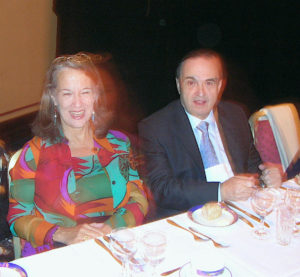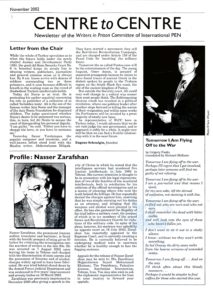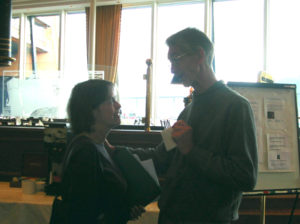PEN Journey 31: Tromsø, Norway: Northern Lights
PEN International celebrates its Centenary in 2021. I’ve been active in PEN for more than 30 years in various positions and now as an International Vice President Emeritus. With memories stirring and file drawers of documents and correspondence bulging, I am a bit of a walking archive and have been asked by PEN International to write down memories. I hope this personal PEN journey will be of interest.
The week before PEN’s 70th World Congress in Tromsø, Norway in the Arctic Circle, my oldest son competed in the Athens 2004 Olympic Games, the only wrestler to qualify for TeamGB (Great Britain). He had dual citizenship and was the first British champion to qualify for the Olympics in wrestling in eight years. In his sport, there was no seeding of competitors; instead, after making weight, each wrestler reached into the equivalence of a hat and drew their first round competitions. True to his history, my son drew the best opponents. As one news commentator noted: “Coming to the mat is Nate Ackerman, born in the US, wrestling for Great Britain, getting his PhD in mathematics at the Massachusetts Institute of Technology…but that won’t help him now as he faces the three-time World Champion from Armenia.” My son lost to the Armenian wrestler. His other opponent was the world bronze medalist from Kazakhstan who went on to win the silver medal at the Olympics. Though my son didn’t win either match, he also didn’t get pinned, and he wrestled nobly. The Olympic Games in Athens was a magical time.

Olympic circles projected in light on the Acropolis at the 2004 Olympic Games in Athens
I was heading to Tromsø with a smile inside, though behind my smile was also a quiet attention that never left me for my youngest son, a Marine, was in Anbar Province, Iraq that summer, patrolling in 120° and alert for IED’s and snipers along the roadside. He had missed his brother in the Olympics and his brother missed being able to talk with him.
As I changed planes in northern Europe, I realized I was going to need a coat in the Arctic Circle and bought a light foldable one at an airport shop which I took to a decade worth of PEN Congresses after. On the plane I reviewed the stack of PEN papers and resolutions.
I was arriving at the Congress having agreed to stand for International Secretary. (See PEN Journey 30). The other PEN member standing was Giorgio Silfer, a poet and playwright and president of Esperanto PEN.
Norwegian PEN hosted over 300 writers, editors, and translators from at least 60 countries for the 70th World Congress whose theme was Writers in Exile—Writers in Minority Languages. The Rica Arctic Hotel where we stayed and met was an easy walk to the small downtown of Tromsø, capital of northern Norway, well above the Arctic Circle and called “the Paris of the North.”
Kjell Olaf Jensen, President of Norwegian PEN, reminded delegates that the Congress themes reflected the literary scene of Tromsø, which would soon join the International Network of Cities of Asylum as the fifth Norwegian city. (This network later developed into the International Cities of Refuge Network (ICORN) in 2006 with PEN’s Writers in Prison Committee as a partner and with the inaugural meeting in Stavanger, Norway.) One of the guiding voices in the exile network Professor Ole Danbolt Mjøs, director of Tromsø University’s Peace Center and President of the Norwegian Nobel Committee, spoke at the Welcome Party Ceremony as did Ole Henrik Magga, President of the Sami Parliament. Half of the estimated 50,000 Sami in the world lived in Norway. Crown Prince Haakon of Norway officially opened the Congress the next day noting, “Freedom of speech is a source of power. If used constructively, it is amazing what speech can do. It can fight corruption, free political prisoners, and make oppressive regimes crumble.”
The two themes of writers in exile and writers in minority languages intertwined throughout the Congress with readings and round tables at cafes and pubs in the midst of Tromsø’s annual International Literary Festival and the International Nana Festival of Aboriginal people. Literary and musical programs included the Sami singer Mari Boine in the Arctic Cathedral and the work of the celebrated but deceased Sami poet, singer, and writer Nils Aslak Valkeapaa. PEN’s programs highlighted some of Norway’s own writers in exile: Mansur Rajih from Yemen, Soudabeh Alishahi from Iran, Islam Elsanov, a film maker from Chechnya, and Chenjerai Hove from Zimbabwe as well as guests Reza Baraheni (Iranian writer living in Canada), Turkish activist Şanar Yurdatapan, and former Russian prisoner and writer Grigory Pasko.
A conference at Tromsø University under the theme “Should Writers Live in Prison?” preceded the Opening Ceremony. Storyteller Easterine Iralu of the “Nagaland nation” addressed the delegates in the main lecture hall: “Every man is a story and every nation is a bristling galaxy of stories. Every nation should be given the right to tell the story by its own story tellers…We are an oral society. Naga writing is an aboriginal achievement.”

New PEN International Secretary Joanne Leedom-Ackerman and PEN International President Jiří Gruša at 70th PEN Congress in Tromsø, Norway, 2004
In later panels Lebanese novelist Amin Maalouf said, “Poets and writers must reinvent the world. This is not a task to be left to politicians. Is this a century of bombs or poems?” Norwegian bestselling author Jostein Gaarder expanded the questions: “How wide are the ethical horizons of literature and art? The question for writers and artists at the start of the third millennium must be what shift in consciousness do we need? Literature is nothing less than a celebration of mankind’s consciousness. So shouldn’t an author be the first to defend human consciousness against annihilation?”
At his first Congress as PEN International President Jiří Gruša told the delegates, “I myself have experienced persecution and really esteem people who help authors to freedom. I know how vital it is to have somebody outside the prison who cannot be stopped. ” He challenged writers to invent and combine practical and stylistic literary methods “to conquer plagues and pestilence that threaten human, moral and planetary evolutions.” He and the delegates of the Congress condemned recent terrorist attacks on a school in Beslan, Russia which had taken the lives of hundreds of children just a few days before. Jiří also paid respect to poet, Nobel laureate and PEN member Czeslaw Milosz, who had recently passed away. “It is with deep grief that the PEN family sympathizes with the people of Poland. We shall miss him, but his work will continue to inspire people from one end of the world to the other.” Milosz was a member of the Writers in Exile American Branch of PEN.

Writers in Prison Centre to Centre newsletter featuring poem by Grigory Pasko, honored guest at 70th PEN Congress and article about prisoner Nasser Zarafshan.
In addition to attending the rich literary panels and discussions, PEN’s Assembly of Delegates passed a resolution that urged authorities to assist in freeing Christian Chesnot and Georges Malbrunot, two French journalists currently held hostage in Iran. Encouraged by Nicaraguan poet Ernesto Cardenal, delegates and participants also signed a petition to the Islamic Republic of Iran demanding that Dr. Nasser Zarafshan’s life be protected and that he be immediately and unconditionally released. Delegates also signed a petition to the President and Government of Russia calling for a multilateral dialogue and an end to the violence in Northern Caucasia and a restoration of civil living conditions in the Chechnyan Republic, including open access so that local and national media could report events in the region. (Chesnot and Malbrunot were released from Iran a few months after the Congress, in late December, 2004. Zarafshan was not released until 2007.)
The Assembly passed resolutions from the Translation and Linguistic Rights Committee (TLRC) urging authorities of the Russian Federation to grant cultural rights to all minorities, including use of regional languages, and the same appeal was sent to authorities in Turkey, Iran and Syria regarding Kurdish language and culture.
Writers in Prison Committee (WiPC) resolutions which the Assembly passed focused on the repression of free expression for writers seeking asylum in Australia, on harassment of certain journalists in Canada, attacks on writers in Chechnya, imprisonments in China and Cuba, censorship and harassment of writers in Egypt, arrests in Eritrea, hostage-taking in Iraq, detentions in the Maldives, killings in Mexico, detention and ill treatment in Myanmar, murder in Nepal, killing and disappearances in Russia, bombings and assassinations in Spain, imprisonments in Turkey, restrictions on the free flow of international writing in the U.S., imprisonments in Uzbekistan and Vietnam, and restrictions on free expression in Zimbabwe.

Administrative Director Jane Spender and PEN International Secretary Terry Carlbom at 70th PEN Congress in Tromsø, Norway, 2004
The WiPC resolutions had been discussed at the earlier Writers in Prison Committee meeting where a new chair had been elected from four candidates. Karin Clark of German PEN would replace Eugene Schoulgin, who was stepping down after four years and was running for the Board of International PEN.
At the Assembly of Delegates, Eugene introduced guest of honor, former Russian main case and journalist Grigory Pasko, who told the delegates that “although he had not been able to thank all those who had worked on his behalf while he was in prison, he now would like to thank everyone again and again. Unfortunately he could not now say that Russia had become more democratic, but he would continue to fight to make it so, supported by all his friends in the Assembly hall.”
Election for the Board of PEN included eight candidates for three open positions. Eric Lax (PEN USA West), Judith Rodriguez (PEN Melbourne), and Eugene Schoulgin (Norwegian PEN) joined the Board. Three new centers—Basque, Guatemala and Kosovo—were admitted into PEN.
At his last Assembly as International Secretary Terry Carlbom told the delegates, “Our greatest strength is ultimately our capacity for empathy, compassion and solidarity. Ours is not the solidarity of the collective herd; it is the solidarity of the concerned and caring individual, a solidarity with a fragile world and fragile civilization. And the solidarity that sometimes can provide comfort in the rather lonely process of creative writing…I have been proud to serve.”
At the Congress Terry saw the passage of the final amending resolutions on the Regulations and Rules of Procedure he had dedicated a significant portion of time to as International Secretary. Updating rules and regulations to bring them in line with the changes PEN had made to its governance was not a task for many writers. I was grateful to Terry that these documents were now drafted and a working document for strategic planning was in hand.
The election for Terry’s replacement as International Secretary was between Giorgio Silfer (Esperanto PEN) and myself. Giorgio’s speech to the Assembly was a poem, an unusual and memorable presentation for office. Giorgio was a linguist and a poet and participated actively on the Peace Committee and Translation and Linguistic Rights Committee. I was a novelist and journalist and activist on the Writers in Prison Committee and Women’s Committee. We had both worked with all committees, but we had our corridors and respected each other. My statement was more traditional.
I was elected the new International Secretary of PEN. I glimpsed the work ahead when I sat down with Terry in the hotel lounge after the election. He told me in November I needed to be at Senegal PEN‘s conference with African centers in Dakar in preparation for the 2007 PEN Congress there, and in the spring I was in charge of a conference PEN was holding in Diyarbakir, Turkey with Kurdish and Turkish PEN. Great, I said. Can you show me the budget and program for the Diyarbakir conference? Terry explained that we didn’t have a budget yet, but he offered to continue helping with this conference. I was to learn quickly that unlike the Writers in Prison Committee, the rest of International PEN worked in a more unstructured fashion, without clear budgets but with relationships that usually came through. I began making lists. My tenure as International Secretary would include notebook after notebook of lists of tasks to be done.
A solace as I left that meeting was that I would be working with Jane Spender, Administrative Director, who was smart, a friend, and had gotten PEN through remarkably tight places before. Jane and I both knew that time was not on our side if we didn’t modernize further. I put on my new PEN coat and went for a brisk walk with Jane in the drizzle towards the next venue. PEN International had been asked for the first time by a major funder to provide an evaluation of a major grant. No one before had asked that of PEN, but it would surely be asked more and more in the future. We walked down the wet Tromsø streets considering what was before both of us. We had to figure out how to do an evaluation and much more…
Next Installment: PEN Journey 32: London Headquarters: Coming to Grips
I have thought about your early days of reporting; the riots and sit ins you covered.
How do you compare todays’ events to those?
I am of course looking through a slightly different lens at a different stage of my life. I have seen progress in the last 40/50 years and hope that will be recognized and built on but I also see much has yet to be done. It is a very important journey ahead that I hope our country can take together with determination.
Your writing is so compelling to read. Not only the fascinating content of what you report, but the dynamic way you connect your thoughts with events. It seems you take me right to the center–somewhere I’ve never been and something I don’t know about–but because I’m ‘with’ you, Joanne it feels healthy and exciting–you have such a balanced perspective. I appreciate your generosity is sharing your various roles in PEN with me.
Thank you, Marilyn, for coming along on the journey. I know you have had your own interesting paths.
This is such a refreshing reminder of what transpired at the Norway Congress. I remember our historic visit to From so, sitting under the igloo and watching the ferocious looking and forever noisy huskies. Thank you Joanne.
Thank you, Mike. I didn’t share that experience and live when people add to the memories. What a long journey for you from Sierra Leone!
Thanks Joanne, lovely to be taken back to shared memories…it was a 10 days of rain Congress, very interesting as always…the Crown Prince added some novelty…great writers as guests and difficuls cases to solve…afterwards a little group flew to the Svalbard islands and it was a very rewarding stay!
I didn’t take the post-Congress trip and am sorry to have missed. But I remember the rain and kept hoping to see the Northern lights which some did see.